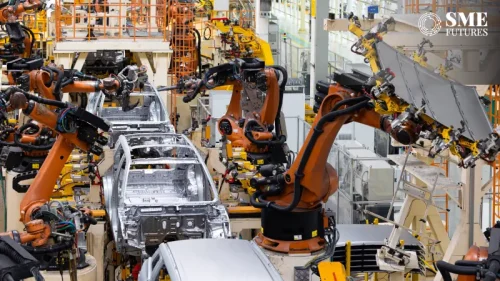SMEs play a pivotal role in shaping regional economic landscapes. They contribute significantly to diverse industries and foster innovation. If we delve deeper into the multifaceted impact of SMEs on economic development, we can draw insights from industry leaders who are working relentlessly to bring grassroots companies to an urban level.
Due to the growth and development in rural areas, a range of issues that need to be addressed get spotlighted. It is hence important to know how these enterprises are fuelling regional growth.
There’s a lot of untapped potential in the regional landscape. With the maximum population of India living in rural areas, SMEs play a crucial role in bringing these talents forward via job creation, income generation and by fostering a culture of innovation and entrepreneurship.

Shaping local industries
“In various regions, particularly in vibrant business hubs such as Kolkata, the SME plays a crucial role in shaping local industries,” says Suresh Mansharamani, Co-founder, Tajurba.
SMEs have emerged as dynamic contributors to the development of local industries, acting as vital cogs in the economic machinery. The distinct operational style of SMEs, rooted in profitability and owner-led decision-making, allows for meticulous cost control, making them essential contributors to the economic tapestry of various regions.
Community commerce is another aspect that SMEs are able to focus on. They not only make operations smoother but also contribute to forming a trustworthy and open environment. It becomes more relevant when you are operating in rural areas.
“Community commerce operates on a system where suppliers are not merely faceless entities and customers are not unknown entities. Community-based networking platforms bridge the gap of anonymity prevalent in traditional B2B platforms. By fostering a sense of community and shared values, these platforms facilitate collaboration among SMEs, ensuring more transparent and trustworthy business interactions,” Mansharamani contends.
The personal touch offered by community commerce has brought about a paradigm shift in B2B interactions, introducing a level of transparency and trust.

Empowering entrepreneurs
“The community commerce platform becomes a catalyst for growth, offering guidance, peer-to-peer learning, and motivation that propels SMEs towards exponential expansion,” Mansharamani avers.
Talks and trainings empower entrepreneurs through shared experiences and mentorship, fostering a conducive environment for regional economic growth. The collective wisdom gained from such platforms becomes a driving force for SMEs, leading to increased productivity and job creation.
“The collaborative journey within these platforms aligns with the power of peer-to-peer learning, providing SMEs with the support and insights they need to thrive in every aspect of their business journey,” he further adds.
Financial solutions to nurture growth and confidence

Tailored offerings from banks and institutions provide much needed backing to the entrepreneurs coming from the regional landscape. As investment power is limited to a budget among the rural population, this financial help further accelerates the growth of the SME ecosystem.
Institutions that are involved in the ecosystem have started to provide tailored offerings to local businesses. These companies, as such, have the experience to understand the shortcomings and pitfalls of this ecosystem. An important aspect to consider when wanting to boost the regional economy.
“Tailored offerings help enhance the positive impact of funding made available to borrowers. Financial institutions understand the significance of tailored financial solutions. Long-term loans for short-term needs or unique repayment patterns cater to the diverse requirements of local businesses, fostering an environment where SMEs can thrive,” says Sumit Sharma, Founder, Radian Finserv.
This approach further ensures that the financial support provided aligns with the specific needs of SMEs, contributing to their sustained growth.
Lending institutions play a crucial role in supplying the essential catalyst for the expansion of SMEs. Ensuring effective and broad-based lending methods guarantees that SMEs can secure the required funds, thereby fuelling economic activity.
“By simplifying the lending process and addressing specific needs, financial institutions contribute to the overall growth of the ecosystem. The emphasis on building a relationship with specific banks and financial institutions highlights the importance of a collaborative approach to financial inclusion,” Sharma adds.
Technological advancements that are safeguarding and empowering regions

Technology-driven solutions not only address security challenges but also contribute to economic growth. As they streamline security processes, these innovations attract investors, ensuring a safer environment and increased confidence in security measures.
“The research and development focus on enhancing product lines with advanced AI-ML-based techniques demonstrates a commitment to continuous improvement and an adaptation to the evolving needs of SMEs in diverse regions. AI-driven security screening solutions contribute to economic growth by enhancing safety protocols, regulations, and addressing risk issues,” says Kapil Bardeja, CEO, Vehant Technologies.
Building competence for SMEs through education and collaboration
International collaborations and educational programmes help in bridging the industry-academia gap. These are especially important in rural areas where entrepreneur sustainability and growth need to be promoted.
“International collaborations and university partnerships provide learners with a broad worldview and hands-on experience, enabling them to navigate diverse circumstances. Collaborations with global universities equip learners with a deep understanding of global concepts. This global perspective is crucial for SMEs, helping them stay competitive in diverse markets and contributing to overall economic growth,” says Gunjan Lalchandani, Head of Growth and Strategy, Hero Vired.
The emphasis on international collaborations reflects a recognition of the interconnected nature of economies and the need for SMEs to navigate the complexities of a globalised world.
“These partnerships give students access to exclusive capstone projects, master seminars, and CV-building exercises to bolster SME industry readiness,” Lalchandani further says.
Educational programmes offered in collaboration with global universities bridge the gap between industry demands and academic curricula. By providing real-world applications, these programmes enhance the competency of learners, making them valuable assets for SMEs that are seeking skilled individuals.
What more needs to be done to accelerate regional economy’s growth?

SMEs have emerged as the unsung heroes of regional economic growth, driving innovation, providing employment opportunities, and contributing to the resilience of local economies. From tailored financial solutions to technology-driven security measures, the impact of SMEs is far-reaching.
As education and collaboration continue to shape the future workforce, the collective efforts of these enterprises have laid the foundation for sustainable and inclusive economic development. The inspiring journeys of SMEs are not just a local phenomenon but a global narrative of growth, collaboration, and prosperity.
“It is important to understand the real problems that these business owners face in their day-to-day lives. They often have to manage all the parts of their businesses – from people to procurement, inventory management, billing, payments, and more importantly customers. Engaging constantly with these business owners is essential to understand the pulse of the market and for anticipating both their evident and latent needs,” points out Rahul Sethi, Senior Vice President and Head of Marketing – India, Worldline.
“Some of the challenges that these merchants face are technology enablement for efficiency, new ways to sell, compliance, online presence and discovery on the Internet, better inventory sourcing options, better utilisation of working capital and inventory management, customer relationships and loyalty, and access to business loans to mention a few,” Sethi adds.
These must be looked into and tackled to boost India’s development and foster the growth of its regional economies.











